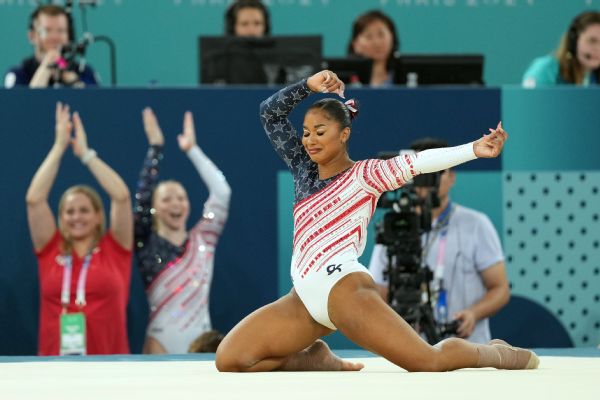
The International Gymnastics Federation restored Romanian gymnast Ana Barbosu to third in the Paris Olympics women’s floor exercise final Saturday, potentially forcing American gymnast Jordan Chiles to return the bronze she won in the event.
It’s unclear whether Chiles will be compelled to send back her medal. The federation, known as FIG, said while it has restored the initial order of finish — with Barbosu third, Romanian teammate Sabrina Maneca-Voinea fourth and Chiles fifth in Monday’s final — the allocation of medals was up to the International Olympic Committee.
The IOC did not immediately respond to a request for comment.
FIG made the decision not long after the Court of Arbitration for Sport voided an appeal from Team USA coach Cecile Landi during the competition that had vaulted Chiles onto the podium.
CAS ruled Saturday that the on-floor appeal Monday by Cecile Landi to have 0.1 added to Chiles’ score came outside the one-minute window allowed by the FIG. The ad hoc committee wrote that Landi’s appeal came 1 minute, 4 seconds after the score was posted.
CAS wrote that the initial finishing order should be restored, with Barbosu third, Maneca-Voinea fourth and Chiles fifth. The organization added the FIG should determine the final ranking “in accordance with the above decision,” but left it to FIG to decide who would get the medal behind gold medalist Rebeca Andrade of Brazil and silver medalist Simone Biles of the U.S.
FIG spokesperson Meike Behrensen said in an email to The Associated Press that “reallocation of medals is the responsibility of the IOC.”
At the Olympics, the governing body of each sport manages the competition and decides the results. The IOC typically accepts that result — once appeals to CAS are completed — and formally awards the medals. It’s unclear if the IOC or FIG would ask Chiles to return her medal. The gymnast is already back in the United States.
The Romanian Gymnastics Federation had asked for three bronze medals to be awarded. Romanian prime minister Marcel Ciolacu reacted to the ruling by saying “justice has been served” and that “in the end, the truth prevailed.”
The ruling adds another layer to what has been a difficult few days for all three athletes. Romanian gymnastics legend and 1976 Olympic champion Nadia Comaneci feared for Barbosu’s mental health because of the wrenching sequence in which she went from bronze medalist to fourth-place finisher.
“I can’t believe we play with athletes mental health and emotions like this… let’s protect them,” Comaneci posted on social media earlier in the week.
Comaneci, at the same time, criticized the judges for the way they scored Maneca-Voinea’s routine — the gymnast was docked 0.1 points for stepping out of bounds, but viral replays showed she narrowly stayed in bounds. Comaneci urged the Romanian Olympic Committee to protest, which it did, but CAS denied that appeal.
Before the final decision was announced, Chiles post on her Instagram story Saturday saying she was heartbroken and was “taking this time and removing myself from social media for my mental health, thank you.”
Chiles’ teammate Suni Lee also reacted to the situation in an Instagram story, writing, “all this talk about the athlete, what about the judges?? completely unacceptable. this is awful and i’m gutted for Jordan. … u have all my flowers and you will ALWAYS be an olympic champion.”
Barbosu and Maneca-Voinea were initially left outside the medals in Monday’s floor final after finishing with matching scores of 13.700. Barbosu thought she had won bronze over Maneca-Voinea via a tiebreaker — a higher execution score — and began celebrating with a Romanian flag.
Chiles was the last athlete to compete and was initially given a score of 13.666 that placed her fifth, behind Maneca-Voinea. Landi called for an inquiry on Chiles’ score, saying after the awards ceremony there was nothing to lose.
Judges awarded the appeal, leapfrogging Chiles past Barbosu and Maneca-Voinea for the final spot on the podium.
Romania also appealed to CAS to have 0.1 added to Maneca-Voinea’s score because she was incorrectly called for stepping out of bounds during her routine. CAS denied that appeal Saturday.
USA Gymnastics said in a statement it is “devastated” by the ruling.
“The inquiry into the Difficulty Value of Jordan Chiles’ floor exercise routine was filed in good faith and, we believed, in accordance with FIG rules to ensure accurate scoring,” the organization wrote.
Chiles, 23, became a target on social media in the aftermath of the late switch, with critics asking her to give back the medal or making racist remarks. Chiles posted on X earlier this week that “it’s funny how people can still never be happy for someone.”
Barbosu made it a point after returning home to Romania that she had no problem with Chiles.
“I only want for everybody to be fair. We don’t want to start picking on other athletes of any nationality,” Barbosu told reporters. “We as athletes don’t deserve something like that. We only want to perform as best as we can and to be rewarded based on our performance. The problems lie with the judges, with their calculations and decisions.”
Chiles’ mother, Gina Chiles, called out the critics in a post, writing she was “tired” of the derogatory comments being leveled at Jordan.
“My daughter is a highly decorated Olympian with the biggest heart and a level of sportsmanship that is unmatched,” Gina Chiles posted. “And she’s being called disgusting things.”
The uncertainty tinges what had been a beautiful moment on the medal stand, when Jordan Chiles and Biles knelt to honor Andrade after the Brazilian star won her fourth medal in Paris.
“It was just the right thing to do,” Biles said about a moment that soon went viral, with even the Louvre itself suggesting it might be worthy of a spot somewhere in the vicinity of the Mona Lisa.
That memory now carries a complicated and emotional postscript.
Information from ESPN’s Alyssa Roenigk was used in this report.
